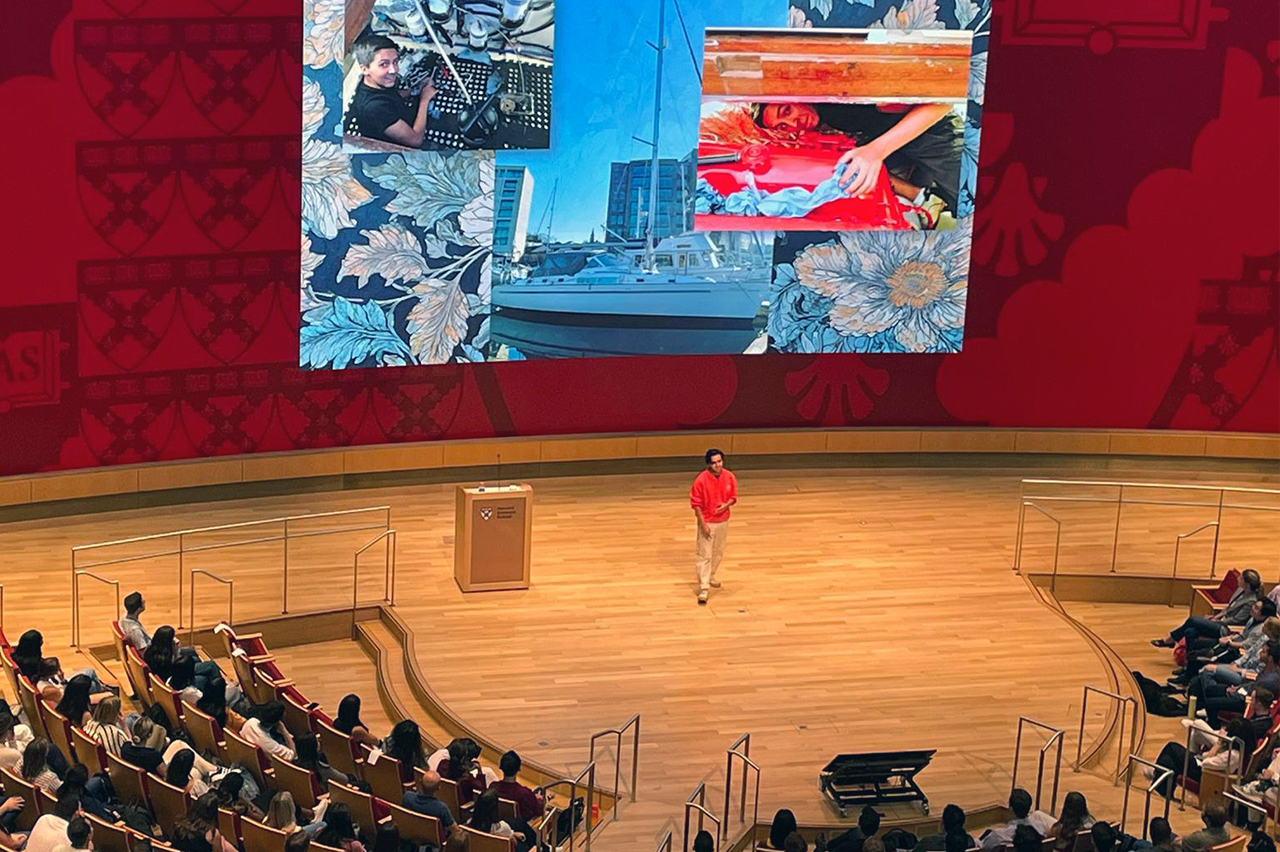Launching Leaders
|
By Shona Simkin  James Bedford (MBA 2025) addresses new MBA students at orientation. Photo courtesy James Bedford.
James Bedford (MBA 2025) smiles as he recalls growing up on a boat off the southwest coast of England. "It was just me and my dad in the most beautiful spot in the world," he says. Looking back now, he recognizes it was poverty—but at the time, "it was just life." Arriving at Harvard Business School in 2023, Bedford encountered some of the same challenges he faced at Harvard College years earlier: finding community and comfort in an unfamiliar culture. This fall, Bedford shared his story with 125 incoming MBA students during the inaugural session of the Ascend Leadership Program, a new initiative he helped establish. “Having enough financial aid to be here is not sufficient to ensure that you have the cultural capital to navigate an environment and institution like HBS,” Bedford explained. “Low-income and first-gen students should be able to participate fully. We want to ensure that they can be the rocket ships for social mobility and potential that we believe they are.” The program, created in partnership with students, Student Academic Services, faculty, Admissions, and Financial Aid, reflects HBS's commitment to ensuring all students have the resources to flourish, regardless of socioeconomic or family background. "The case method functions at its best with diverse perspectives that challenge assumptions—it deepens the learning experience for all,” said Alicia Thomas, director of diversity and inclusion, MBA and Doctoral programs. “True excellence is not just about individual achievement—it's about creating an environment where all voices are heard, valued, and empowered to lead. We're aiming to equip all students with what they need to thrive by fostering a deeper understanding of socioeconomic inclusion throughout the two-year program. Through this work, our students are not only prepared to excel but also to lead with empathy, insight, and a broader understanding of the world." During the pre-orientation, Bedford, Dean Srikant Datar, and Professor Juan Alcacer shared their personal experiences and insights. Practical sessions focused on budgeting, academic strategies, and leveraging campus resources. Structured and informal events throughout the year—small dinners with faculty members, alumni networking events, monthly casual group gatherings, and workshops on professional skills like networking and small talk—ensure ongoing support and connection. For Claire Pang (MBA 2026), the orientation provided both practical information and a sense of community. “Tactically, the [pre-orientation] equipped me with knowledge, for example about section dues, which are $300 to $400. We needed to know that the fee was coming up, and how to budget for it,” she said. “The best part for me is having friends who are in other sections. We have this commonality. There can be an assumption that everyone comes from college-educated parents, which is simply not true. Without Ascend, I might feel like the only person in the classroom who was a first-gen student or came from a lower-income family.” Bedford emphasized the value of creating these connections. “I had a lot of pretty challenging classroom encounters and discussions that touched on identities that were really close to my heart but weren’t necessarily visible or obvious to other people—or ones where I didn’t want to opt in as the representative or spokesperson,” he said. “Knowing that there are seven to 10 others in your section who get it, who you don’t have to explain the reasoning to, opens up a level of comfort and support. You don’t have to justify who you are here.” Professor Alcacer shared his motivation for getting involved. “I come from a low-income family of immigrants—my parents never finished primary school. I was the first one who went [to college], so I know how it feels to be different from everybody, not only as a student but also as a faculty,” he said. “This is a time to recognize what we’ve done and try to erase any barriers that we may still have. We are a more diverse community than people think, in the traditional ways of race and gender but also diverse in ideologies and backgrounds. This type of program will help people see that we are far more representative of the country in terms of its many dimensions than people give us credit for.” The Ascend Leadership Program is part of broader efforts to ensure that every MBA student feels that they are a valued member of the community and have the resources they need to succeed. Since 2020, initiatives addressing barriers for students from lower socioeconomic backgrounds have included the creation of the First-Generation Students Club, financial wellness programming, and scholarships covering the total cost of tuition and fees for students with the greatest financial need—about 10 percent of the student body. For Dewan Sharfaraz Ahmed (MBA 2026), Ascend laid the foundation for maximizing his HBS experience. “I was determined to attend HBS, but like many Ascend Leaders, stepping away from the workforce for two years carries significant financial considerations,” Ahmed stated. “Ascend provided an immediate community of driven peers with similar backgrounds and challenges—something that would have taken months to build on my own. At HBS, the pace is relentless, and it’s important to remember that this is a marathon, not a sprint. Ascend isn’t just a support system; it is a tailwind, propelling me forward from day one with confidence.” |
Post a Comment
Comments must be on-topic and civil in tone (with no name calling or personal attacks). Any promotional language or urls will be removed immediately. Your comment may be edited for clarity and length.
